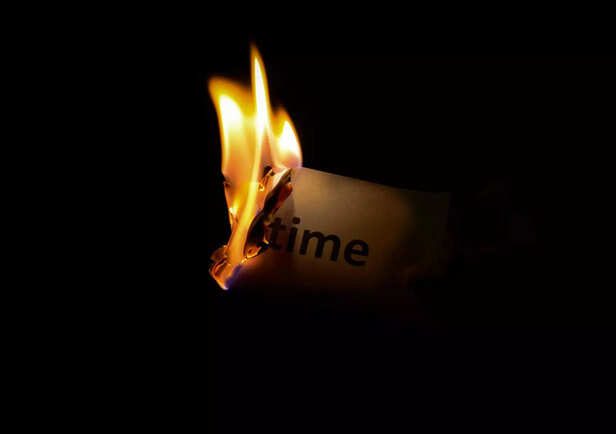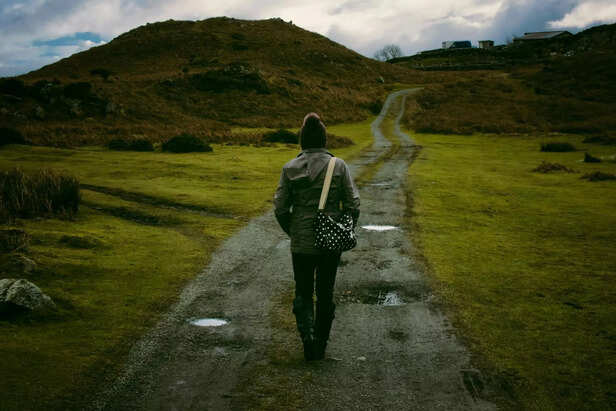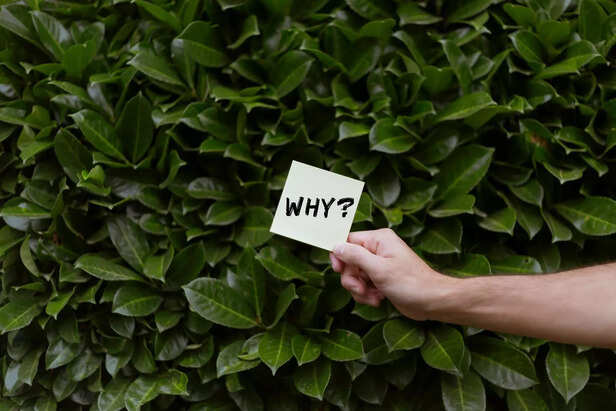Still Overthinking? Gita’s Reminder: Doubt Killed More Dreams Than Failure Ever Did
Riya Kumari | Jun 25, 2025, 17:26 IST
( Image credit : Pexels, Timeslife )
Let’s get one thing straight: Overthinking is not a cute personality trait. It’s not mysterious or charming. It’s exhausting. It's standing at the buffet of life, starving, and still not putting anything on your plate because what if the chicken’s dry? And according to the Bhagavad Gita—yes, the OG manual for life crisis management—there’s something far more lethal than failure.
We rarely fail because we tried and it didn’t work. Most of us fail long before that—in our heads, in silence, in the quiet backseat of overthinking. There’s a line in the Bhagavad Gita that doesn’t come with a dramatic backdrop or a thunderclap, but it should. It says: “The person who doubts himself is doomed.” (Gita 4.40)
It’s not a warning. It’s a diagnosis. And maybe it stings because we know it’s true. We’ve doubted ourselves out of opportunities, out of relationships, out of second chances. Not because we didn’t want those things—but because somewhere between wanting and acting, we let the doubt sit in the driver's seat.
Doubt Is Quieter Than Fear, But Far More Dangerous

Fear screams. Doubt whispers.
It sounds like “Maybe I’m not ready.”
Or “What if this isn’t the right time?”
Or the most convincing one: “Let me think about it a little more.”
But behind every one of those lines is a hesitation that’s slowly tightening its grip. It convinces you that staying stuck is safer. That not deciding is wiser. That waiting longer will bring clarity. The Gita disagrees. It says: Clarity comes through action. Not thought.
Overthinking Isn’t Wisdom. It’s Delayed Living

Let’s be honest—many of us mistake overthinking for maturity. As if mentally rehearsing worst-case scenarios is a sign of intelligence. It’s not. It’s just fear in disguise. Wisdom isn’t about knowing everything. It’s about trusting what you already know—and then acting on it. That’s what Krishna tells Arjuna. Not to be reckless.
Not to be impulsive. But to stop standing still in the face of his calling. Overthinking doesn’t protect us. It just pauses our lives long enough for courage to expire.
So, What Do You Do When You Don’t Know What to Do?

You act anyway. Not blindly. But faithfully. The Gita says: Act without attachment to outcomes. Which means: Let go of needing certainty before you move. Let go of needing every answer before you begin. Choose your path—not because it guarantees success, but because not choosing is already a form of loss. And if you're scared? Good. That means the thing matters.
But doubt? Doubt makes you forget that. It makes you chase perfection when all life really requires is presence. Not a flawless plan. Just a willing step.
The Truth Most of Us Avoid

Every single person you admire has doubted themselves. The difference is—they didn’t wait for the doubt to go away before moving forward.
They carried it.
Walked through it.
Outgrew it.
And that’s the part we don’t like hearing. Because it means the power was always with us—not in our circumstances, not in the timing, not in someone else’s permission. It was—and always is—in the decision to act, even while doubting.
The Choice Is Yours

You can live a life shaped by clarity. Or you can live a life ruled by hesitation. But not both. The Gita doesn’t say “don’t feel doubt.” It says, “don’t be ruled by it.” And maybe that’s all we need to remember when we catch ourselves spinning in the same mental loops: Doubt didn’t keep you safe. It kept you stuck. So what if you failed?
Failure teaches.
Doubt just delays.
One you can grow from. The other? You’ll never even know what you missed.
So today, don’t aim for the perfect move. Just make one
Even if your hands shake. Even if your voice trembles. Even if your brain offers another 20 reasons to wait. Choose action over agony. Trust over perfection. Clarity through motion. Because sometimes, the wisest thing you can do—is simply begin.
It’s not a warning. It’s a diagnosis. And maybe it stings because we know it’s true. We’ve doubted ourselves out of opportunities, out of relationships, out of second chances. Not because we didn’t want those things—but because somewhere between wanting and acting, we let the doubt sit in the driver's seat.
Doubt Is Quieter Than Fear, But Far More Dangerous

Doubt
( Image credit : Pexels )
Fear screams. Doubt whispers.
It sounds like “Maybe I’m not ready.”
Or “What if this isn’t the right time?”
Or the most convincing one: “Let me think about it a little more.”
But behind every one of those lines is a hesitation that’s slowly tightening its grip. It convinces you that staying stuck is safer. That not deciding is wiser. That waiting longer will bring clarity. The Gita disagrees. It says: Clarity comes through action. Not thought.
Overthinking Isn’t Wisdom. It’s Delayed Living

Time
( Image credit : Pexels )
Let’s be honest—many of us mistake overthinking for maturity. As if mentally rehearsing worst-case scenarios is a sign of intelligence. It’s not. It’s just fear in disguise. Wisdom isn’t about knowing everything. It’s about trusting what you already know—and then acting on it. That’s what Krishna tells Arjuna. Not to be reckless.
Not to be impulsive. But to stop standing still in the face of his calling. Overthinking doesn’t protect us. It just pauses our lives long enough for courage to expire.
So, What Do You Do When You Don’t Know What to Do?

Walk
( Image credit : Pexels )
You act anyway. Not blindly. But faithfully. The Gita says: Act without attachment to outcomes. Which means: Let go of needing certainty before you move. Let go of needing every answer before you begin. Choose your path—not because it guarantees success, but because not choosing is already a form of loss. And if you're scared? Good. That means the thing matters.
But doubt? Doubt makes you forget that. It makes you chase perfection when all life really requires is presence. Not a flawless plan. Just a willing step.
The Truth Most of Us Avoid

Why
( Image credit : Pexels )
Every single person you admire has doubted themselves. The difference is—they didn’t wait for the doubt to go away before moving forward.
They carried it.
Walked through it.
Outgrew it.
And that’s the part we don’t like hearing. Because it means the power was always with us—not in our circumstances, not in the timing, not in someone else’s permission. It was—and always is—in the decision to act, even while doubting.
The Choice Is Yours

Choice
( Image credit : Pexels )
You can live a life shaped by clarity. Or you can live a life ruled by hesitation. But not both. The Gita doesn’t say “don’t feel doubt.” It says, “don’t be ruled by it.” And maybe that’s all we need to remember when we catch ourselves spinning in the same mental loops: Doubt didn’t keep you safe. It kept you stuck. So what if you failed?
Failure teaches.
Doubt just delays.
One you can grow from. The other? You’ll never even know what you missed.
